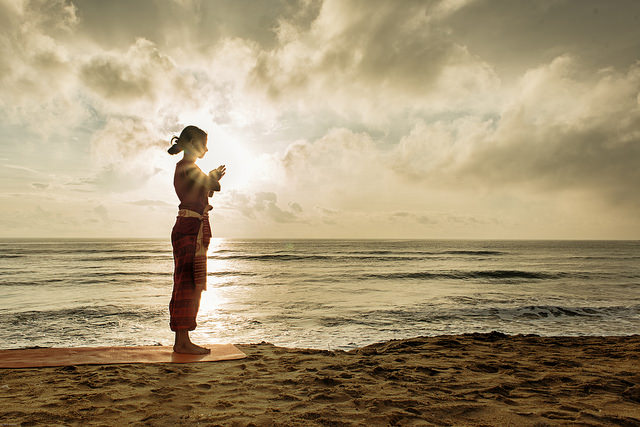
“[Yoga] is not about exercise but to discover a sense of oneness with yourself, the world and nature. By changing our lifestyle and creating consciousness, it can help us deal with climate change.” ~ Indian Prime Minister Narendra Modi, in his maiden speech to the UN General Assembly.
Compared to chaining ourselves to logging machinery, protesting on city streets and pleading with our politicians, yoga seems like a tool with little direct environmental impact, doesn’t it? No jargon-riddled political promises or economic incentives are proposed as a result of an hour of saluting to the suns. If we are to say yoga is part of the answer, then it sounds like climate change is a personal problem to be dealt with on an individual level.
And yet, we know this isn’t true.
Climate change is not an individual problem, and it doesn’t have solely individual solutions.
But, who is to blame for climate change, if not individuals? Is it Adani and BHP Billiton? Is it the failure of American leadership since the Golden Age to restrain the activities of capitalism? Is it money itself?
By emphasizing the importance of oneness with ourselves in answering a global threat, Narendra essentially reminds us that our systems are made of us—our lifestyles, our consciousness. Our own lives, and the choices we make about the systems we subscribe to, are fundamentally where we need to begin in order to have impact.
None of us can shake the blame for climate change because, fundamentally, the issue is that our population is 7.3 billion and we all want and crave.
This is the argument that demoralizes and derails most of the people with whom I discuss the environmental issues we face. My friends argue they are not going to virtuously wipe themselves off the face of the planet or give up their job to go off the grid, so what do I expect them to do about the fact that they exist?
But it is precisely this disempowered feeling of having to give up the life that the person next to us is blindly and blissfully enjoying that makes the statistic of 7.3 billion people the problem.
Unfortunately, our solution to climate change can’t be to give up what we want and crave because, fundamentally, we all suffer when we feel a sense of lack. Just think about how much we all suck at going on diets.
Instead, an upstream, truly hopeful approach to tackling climate change is to start to reduce our desires and cravings in the first place.
Collectively, our answer to climate change is oneness. Though those unfortunately prolific “yogercise” classes you might have attended may have convinced you otherwise, yoga is, in its most simple definition, about forgetting the borders of our self—our job, our cravings, our desires—to be satisfied and fulfilled with the present as it is.
In Sanskrit the word yoga means to yoke, to harness and to unite our understanding of our self, the world and everything already available to us so as to use it consciously.
In order to be part of a solution that can be adopted by the 7.3 billion people in this world who have varying levels of self-restraint and understandings of responsibility, our individual approach to tackling climate change has to be about changing our attitude. To not desire that new skirt or that new car, or that new over-time, full-time job that is required in order to afford them in the first place.
What happens when the borders of our self starts to blur and we start to identify with the world around us? What happens when we feel fulfilled just as we are, and we hold inner security and confidence that comes from knowing that there is no inner and outer, but everything is just as it is right now?
The answers are beautiful: We’re content; consumption to find happiness is slowed and n fact, is not even required.
All of us, and yet not just one of us, must carry the task of tackling climate change. So it has to be a concerted effort—a sense of oneness must exist in every one of us individually before we can be one, and that can only start with ourselves.
We have to feel that we don’t need to consume anything—not because we know the catastrophic consequences if we continue as we are, but because we know each other and this beautiful world already laid before us.
It’s time to be here now and to reap the latent benefits of the sun rising behind the blinds before we even turn on the lights.
~
Relephant:
Yoga Practice for the Climate Crisis.
~
Author: Anna Dunn
Apprentice Editor: Monica LaSarre / Editor: Travis May
Photo: Flickr/Michael Pravin






Read 0 comments and reply